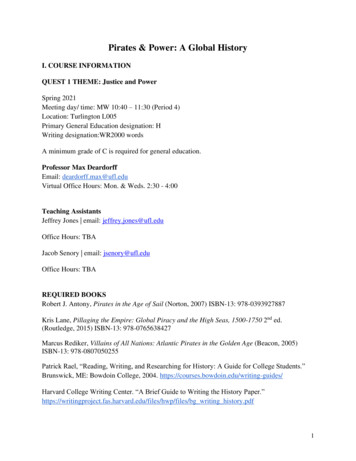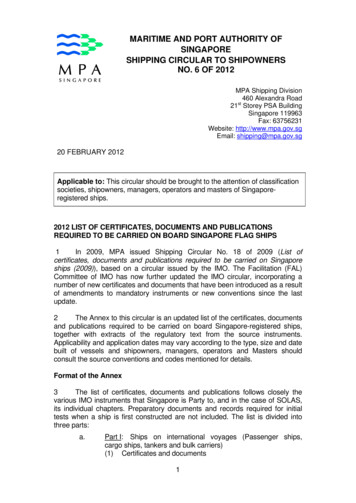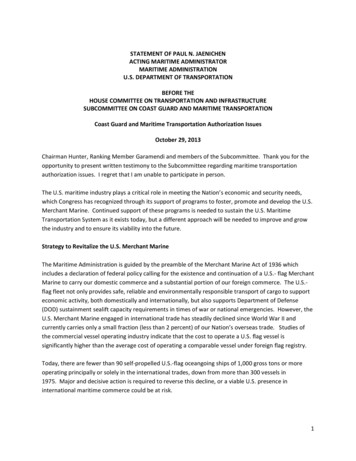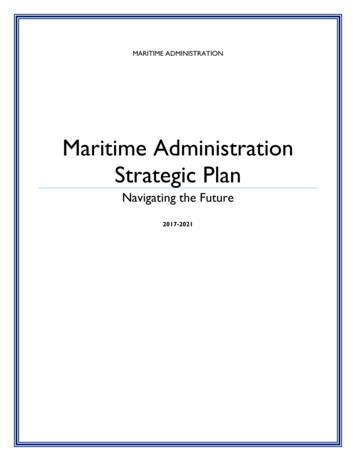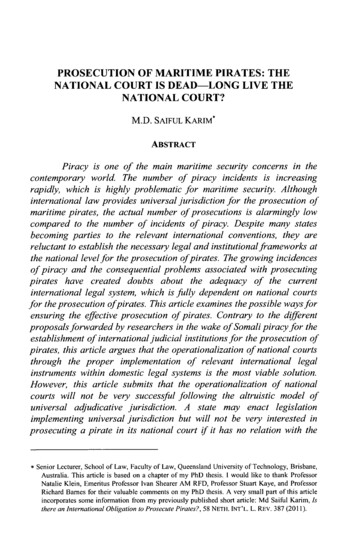
Transcription
PROSECUTION OF MARITIME PIRATES: THENATIONAL COURT IS DEAD-LONG LIVE THENATIONAL COURT?M.D. SAIFUL KARIMABSTRACTPiracy is one of the main maritime security concerns in thecontemporary world. The number of piracy incidents is increasingrapidly, which is highly problematic for maritime security. Althoughinternationallaw provides universaljurisdictionfor the prosecution ofmaritime pirates, the actual number of prosecutions is alarmingly lowcompared to the number of incidents of piracy. Despite many statesbecoming parties to the relevant international conventions, they arereluctant to establish the necessary legal and institutionalframeworks atthe national level for the prosecution of pirates. The growing incidencesof piracy and the consequential problems associated with prosecutingpirates have created doubts about the adequacy of the currentinternational legal system, which is fully dependent on national courtsfor the prosecution ofpirates. This articleexamines the possible ways forensuring the effective prosecution of pirates. Contrary to the differentproposalsforwarded by researchersin the wake of Somali piracyfor theestablishment of internationaljudicial institutionsfor the prosecution ofpirates, this article argues that the operationalizationof national courtsthrough the proper implementation of relevant international legalinstruments within domestic legal systems is the most viable solution.However, this article submits that the operationalization of nationalcourts will not be very successful following the altruistic model ofuniversal adjudicative jurisdiction. A state may enact legislationimplementing universal jurisdiction but will not be very interested inprosecuting a pirate in its national court if it has no relation with the* Senior Lecturer, School of Law, Faculty of Law, Queensland University of Technology, Brisbane,Australia. This article is based on a chapter of my PhD thesis. I would like to thank ProfessorNatalie Klein, Emeritus Professor Ivan Shearer AM RFD, Professor Stuart Kaye, and ProfessorRichard Barnes for their valuable comments on my PhD thesis. A very small part of this articleincorporates some information from my previously published short article: Md Saiful Karim, Isthere an InternationalObligation to ProsecutePirates?,58 NETH. INT'L. L. REV. 387 (2011).
38Wisconsin InternationalLaw Journalpiraticalincident. Rather, it will be successful if the global communityseriously implement the Conventionfor the Suppression of Unlawful Actsagainst the Safety of Maritime Navigation (SUA Convention), whichobligates the states that have some connection with a piratical incidentto prosecutepirates in their national courts. 38.Introduction. 42.I. International Law of PiracyA. Definition of Piracy under UNCLOS and the Issue of the. 43Operationalization of Courts43.i. Geographic Limits .ii. Universal Jurisdiction.47. 50.B. Piracy and the SUA ConventionII. The Winter of Despair and the Spring of Hope: A Case Study. 56on Somali Piracy .A. Is an International or Regional Court the Answer?. . . . . . 59B. Is There a Real Legal Obstacle in Prosecuting Somali. . . . . . . . . . . .64Pirates in National Courts?. . . . . . .72C. The Role of National Courts .III. Prosecution of Pirates: Operationalizing Judicial Institutions.76A. Towards a Permanent International Judicial Institution. . . . . . . 76for the Prosecution of Pirates? . . . . . . . . . . .76.i. ITLOS. 78ii. ICC.B. Operationalizing the Role of National Courts: Miles toGo before We Sleep.81. 93IV. ConclusionINTRODUCTIONPiracy is one of the main maritime security concerns in thecontemporary world.' At the end of the nineteenth century and into thetwentieth century, incidents of piracy were declining and were supposedIn 2008, the U.N. Secretary General identified seven major threats to the maritime security, ofwhich piracy was identified first. See U.N. Secretary-General, Oceans and the Law of Sea: Rep.of the Secretary-General, Jl 54-71, U.N. Doc. A/63/63 (Mar. 10, 2008). Piracy has beenidentified as the major threat to the maritime security in some subsequent reports, see U.N.127-134, U.N.Secretary-General, Oceans and the Law ofSea: Rep. of the Secretary-General, 111Doc. A/64/66 (Mar. 13, 2009); U.N. Secretary-General, Oceans and the Law of Sea: Rep. of theSecretary-General, U.N. Doc. A/65/69/Add.2 (Aug. 31, 2010).
Vol. 32 No. 1IProsecutionof MaritimePirates39to become an issue of historical interest.2 However, piracy again emergedas a major concern for the global community from the 1970s,' when itreturned more aggressively. Nowadays, piracy is one of the mainproblems of the sea transport system.The number of piracy incidents is increasing rapidly, which ishighly problematic for maritime security.' There are some piracyhotspots in the world. The most affected areas for piracy are the Gulf ofAden, the Red Sea, and the waters off the coasts of Somalia, Bangladesh,Nigeria, Indonesia, and Malaysia.' Recently, a large number of piracyincidents have occurred off the coast of Somalia, leading the globalcommunity to think about this age-old problem from a new perspective.'Piracy has again become a major issue, not only for its increasingoccurrence, but also for the adverse effects on global trade andcommerce.' Piratical activities in the twenty-first century appear to be2H.E. Jos6 Luis Jesus, Protectionof Foreign Ships against Piracy and Terrorism at Sea: LegalAspects, 18 INT'L. J. MARINE & COASTAL L. 363, 364 (2003). The number of piracy incidentsdeclined in the early twentieth century, as indicated by the title of an article written by E DDickinson in 1925, namely 'Is the crime of piracy obsolete?' Dickinson was visionary enough toidentify the future importance of the law of piracy and commented that '[w]hile the occasions forinvoking its rules are less frequent, it may still be made a potent factor in preventing lawlessnessupon the seas'. He went further and said that the law of piracy belonged to 'the law in reserverather than to the law in history'. Edwin D. Dickinson, Is the Crime of Piracy Obsolete?, 38HARV. L. REV. 334 (1925).Jesus, supra note 2, at 363-4.4Id. at 363; U.N. Secretary-General, supranote 1; LAUREN PLOCH ET AL., PIRACY OFF THE HORNOF AFRICA 5 (2009).5PLOCH, supra note 4; Int'l Maritime Org. [IMO], Reports on Acts of Piracy andArmed RobberyAgainst Ships: Annual Report 2009, 118, IMO Doc. MSC.4/Circl52 (Mar. 29, 2010); IMO,Report on Acts of Piracyand Armed Robbery Against Ships, 1 4, Doc. MSC.4/Cric133 (Mar. 19,2009); IMO, Reports on Acts of Piracy and Armed Robbery Against Ships: Annual Report 2010,1 5, Doc. MSC.4/Circl69 (Apr. 1, 2011); IMO, Reports on Acts of Piracy and Armed RobberyAgainst Ships: Annual Report 2011,115, IMO Doc. MSC.4/Circl80 (Mar. 1,2012); IMO, Reporton Acts of Piracy and Armed Robbery Against Ships: Annual Report 2012, 1 5, Doc.MSC.4/Circ.193 (Apr. 2, 2013); Stuart McMillan, Piracy: An Old Menace Re-Emerges, N.Z.INT'L. REV., Mar.-Apr. 2002, at 21, 22.6INT'L MAR. BUREAU, PIRACY AND ARMED ROBBERY AGAINST SHIPS-ANNUAL REPORT 2009, 6(2010).Tullio Treves, Piracy, Law of the Sea, and Use of Force: Developments off the Coast ofSomalia, 20 EUR. J. INT'L L. 399 (2009); Eugene Kontorovich, A Guantanamoon the Sea: TheDifficulty of ProsecutingPiratesand Terrorists, 98 CAL. L. REV. 243 (2010).Alexa K. Sullivan, Piracy in the Horn of Africa and its Effects on the Global Supply Chain, 3 J.TRANSP. SEC. 231 (2010); Xiaowen Fu et al., The Impacts of Maritime Piracy on GlobalEconomic Development: The Case ofSomalia, 37 MAR. POL'Y & MGMT. 677 (2010).
40Wisconsin InternationalLaw Journalmore frequent, sophisticated, and severe compared to the twentiethcentury's blight of piratical activity.'Although international law provides universal jurisdiction for theprosecution of maritime pirates, the actual number of prosecutions isalarmingly low compared to the number of incidents of piracy.o Despitemany states becoming parties to the relevant international conventions,"they are reluctant to establish the necessary legal and institutionalframeworks at the national level for the prosecution of pirates. However,due to growing awareness created by Somali piracy, states are graduallychanging this attitude. Under international law, the prosecution of piratesis entirely within the domain of national courts, as no international courtor tribunal has jurisdiction to prosecute an individual for piracy.International law has instead anticipated a vital role for national courtsfor the enforcement of international law relating to piracy. This is an areaof international law where the national court is the main judicialinstitution for the implementation of international law.The growing incidence of piracy and the consequential problemsassociated with prosecuting pirates have created doubts about theadequacy of the current international legal system, which is fullydependent on national courts for the prosecution of pirates. Although it isnot possible to determine whether the non-operationalizationl 2 ofnational courts has played a role in the increasing occurrence of piracy,the need to reassess the existing system cannot be ignored. It is apparent9John 1. Winn & Kevin H. Govern, Maritime Pirates, Sea Robbers, and Terrorists: NewApproaches to Emerging Threats, 2 HOMELAND SEC. REV. 131, 132 (2008).10 U.N. Secretary-General, Report of the Secretary-General on Possible Options to Further theAim of Prosecuting and Imprisoning Persons Responsible for Acts of Piracy and Armed Robberyat Sea off the Coast of Somalia, U.N. Doc. S/2010/394 (Jul. 26, 2010) [hereinafter SecretaryGeneral Report 2010]; U.N. Secretary-General, Report of the Special Adviser to the SecretaryGeneral on Legal Issues Related to Piracy off the Coast of Somalia, 1143, U. N. Doc. S/2011/30(Jan. 25, 2011), 21 [hereinafter Special Adviser Report].1 See United Nations Convention on Law of the Sea, Dec. 10, 1982, 1833 U.N.T.S. 397[hereinafter UNCLOS]; Convention for the Suppression of Unlawful Acts Against the Safety ofMaritime Navigation, Mar. 10, 1988, 1678 U.N.T.S. 221 [hereinafter SUA Convention 1988].12 In this article, the term operationalization or operationalize is employed to determine whether ajudicial institution is working or ready to be used for the prosecution of offenders. This termsignifies something broader than the mere implementation of international law; it will be used toshow whether an institution is practically operating, thereby enhancing the application ofinternational law. On operationalization, See generally Jeni L. Burnette, Operationalization, inENCYCLOPEDIA OF SOCIAL PSYCHOLOGY 635 (Roy F. Baumeister & Kathleen D. Vohs eds.,2007); CONCISE OXFORD ENGLISH DICTIONARY 1002 (Catherine Soanes & Angus une.edi.au/WebStat/unit-materials/c2 research design/operation alism.htm (lastvisited Dec. 17, 2010).
Vol. 32 No. 1IProsecutionof MaritimePirates41that the timely prosecution of pirates will serve as an effective deterrentfor people who are engaged in this activity, as well as discourage newpeople from being recruited as pirates.The legal and practical complexity surrounding the prosecutionof Somali pirates reveals some problems with the existing internationallegal and institutional framework. The situation in Somalia hascompelled the global community to reflect on whether the currentreliance on national courts needs reform. Through Resolution 1918, theSecurity Council requested the Secretary-General propose possibleoptions for the prosecution of Somali pirates, including "options forcreating special domestic chambers possibly with internationalcomponents, a regional tribunal or an international tribunal andcorresponding imprisonmentarrangements."Accordingly, theSecretary-General submitted a report to the Security Council identifyingseven options for prosecuting and imprisoning persons responsible foracts of piracy and armed robbery off the coast of Somalia.14 The SecurityCouncil now appears to be convinced that the establishment ofspecialized anti-piracy courts in Somalia and other states in the regionwith substantial international participation and/or support, as well ascapacity building of national courts in the region (and globally), may bethe most suitable option."Concurring with the most recent approach of the globalcommunity, this article argues that the operationalization of nationalcourts is the most viable option for ensuring the effective prosecution ofpirates. The operationalization process will only be successful if there isa firm political will from the executive of the states for theimplementation of international law in the domestic arena, as well as aproactive role from judicial institutions in interpreting national law in thelight of international obligations. However, in operationalizing nationalcourts, states may be reluctant to follow the altruistic model of universaladjudicative jurisdiction established by UNCLOS. A state may not bevery interested in prosecuting a pirate in its national court if it has norelation with the piratical incident. 6 Against this backdrop it may be" S.C. Res. 1918,114, U.N. Doc. S/RES/1918 (Apr. 27, 2010).14 See Secretary General Report 2010, supra note 10." S.C. Res 2015,18, 19, U.N. Doc. S/RES/2015 (Oct. 24, 2011).16It can be argued that countries in the African region are now prosecuting Somali pirates evenwithout any relation to incidents of piracy. In fact, they are doing this with external financialassistance. However "the burden that long and costly trials place on these nations often makes itunappealing for them to accept captured pirates unless supplemented by financial support from
Wisconsin InternationalLaw Journal42vitally important to implement the Convention for the Suppression ofUnlawful Acts against the Safety of Maritime Navigation (SUAConvention), which obligates the states that have some connection with apiratical incident to prosecute pirates in their national courts."Part I of this article introduces the international law of piracy.This part deals with some contemporary and longstanding debatessurrounding the suitability of universal jurisdiction, codified in theUnited Nations Convention on the Law of the Sea (UNCLOS), for theprosecution of individuals involved in maritime piracy. It also examinesthe applicability of other international conventions in respect to maritimepiracy and armed robbery. It further examines whether these laterconventions are successful in filling the gaps in the UNCLOS regime.Finally, this part examines the importance of operationalizing the roles ofnational courts in the context of universal jurisdiction. Part II presents acase study on Somali piracy, and explains the practical complexity inprosecuting pirates based on universal jurisdiction in light of the Somaliexperience. Part III explores the options for the prosecution of piratesgenerally, and discusses the role of national and international courts intheir prosecution. It also examines a number of options for theestablishment of an effective prosecution system, including creating aninternational judicial mechanism, as well as strengthening andoperationalizing the anticipated roles of national courts. Part IVconcludes with some observations for a more coherent legal andinstitutional framework for the effective prosecution of pirates.I.INTERNATIONAL LAW OF PIRACYThe main aim of this section is to determine the jurisdictionalscope of national courts for the prosecution of pirates. There are twoimportant jurisdictional issues in assessing the role of judicialinstitutions. First, what types of maritime violence can be treated aspiracy? Second, what is the jurisdictional scope for different states toprosecute the perpetrator?7the international community." AMBER RAMSEY, REGIONAL COURTS AND PRISONS: DEVELOPINGLOCAL CAPACITY TO PROSECUTE SOMALI PIRATES (2012).This proposition has been supported by economic analysis, see Paul Hallwood and Thomas J.Miceli, The Economics of International Cooperation in the Apprehension and Prosecution ofMaritime Pirates,43 OCEAN DEV. & INT'L L. 188 (2012).
Vol. 32 No. 1A.Prosecution of Maritime Pirates43DEFINITION OF PIRACY UNDER UNCLOS AND THE ISSUE OF THEOPERATIONALIZATION OF COURTSThe international law definition of piracy as stated in UNCLOSis very restricted in relation to the geographical and subject matteraspects." The definition of piracy has at least three shortcomings thatmake the UNCLOS provisions largely inapplicable in combating manyaspects of modem-day maritime violence: geographic limits, thecondition of private ends, and the two ships' condition. The issues ofprivate ends and the two ships are not very problematic for piracy." As alarge number of contemporary piratical incidents occur within theterritorial seas of the coastal state, the geographic limits of UNCLOS'sprovision is now a very important issue and is discussed below.i. GeographicLimitsAs defined in UNCLOS, piracy must be on the high seas or inthe exclusive economic zone (EEZ).2 0 Maritime violence outside theterritorial seas was historically regarded as piracy if it fulfilled otherconditions. UNCLOS created the sui generis zone of the EEZ where the'8 UNCLOS defines piracy as follows:"Piracy consists of any of the following acts:(a) any illegal acts of violence or detention, or any act of depredation, committed for private ends bythe crew or the passengers of a private ship or a private aircraft, and directed:(i) on the high seas, against another ship or aircraft, or against persons or property on board suchship or aircraft(ii) against a ship, aircraft, persons or property in a place outside the jurisdiction of any State(b) any act of voluntary participation in the operation of a ship or of an aircraft with knowledge offacts making it a pirate ship or aircraft(c) any act of inciting or of intentionally facilitating an act described in subparagraph (a) or (b)."UNCLOS, supra note 11, art. 101. This definition is now regarded as the general definition ofpiracy. UNITED NATIONS CONVENTION ON THE LAW OF THE SEA, 1982: A COMMENTARY 197920(Myron H. Nordquist et al. eds., 2002).However, there are serious problems regarding the applicability of the international law ofpiracy in respect to maritime terrorism.UNCLOS, supra note 11, art. 58(2). According to Article 58(3) of UNCLOS, "In exercisingtheir rights and performing their duties under this Convention in the exclusive economic zone,States shall have due regard to the rights and duties of the coastal State and shall comply with thelaws and regulations adopted by the coastal State in accordance with the provisions of thisConvention and other rules of international law in so far as they are not incompatible with thisPart." This article may raise a question as to whether this due regard obligation confers anyregulatory power on the coastal state. In fact "the due regard duty does not confer regulatorypower on any of its beneficiary." J. Ashley Roach, CounteringPiracy off Somalia: InternationalLaw and InternationalInstitutions, 104 AM. J. INT'L L. 397, 398-99 (2010).
44Wisconsin InternationalLaw Journalcoastal state has sovereign rights, not sovereignty, and UNCLOSspecifically made a provision to ensure the applicability of internationallaw related to piracy in the EEZ.2 1 The provision does not extend tomaritime violence in the territorial sea, archipelagic waters, and internalwaters of the coastal state. However, many of the modern-day attacks onships occur in the territorial seas of coastal states.22 Statistics show thatmore than two-thirds of the reported incidents are outside the scope ofthe present definition of piracy under international law. 23 Although therehad been an initiative for the reform of a piracy-related provision in thenegotiation process of UNCLOS to replace the term "on the high seas"with the term "anywhere in the ocean space," this proposal did not gainsupport.24Providing jurisdiction only to coastal states in cases of armedrobbery in the territorial waters and not treating such incidents as piracyis arguably justified considering the sovereignty of the coastal state overits territorial waters. 25 The International Maritime Organization (IMO)has divided acts of piracy into two categories based on geographicaldivision: piracy as defined in UNCLOS and a new category called"armed robbery." 26 The IMO defines armed robbery as "any unlawful actof violence or detention or any act of depredation, or threat thereof, otherthan an act of 'piracy,' directed against a ship, or against persons orproperty on board such a ship, within a State's jurisdiction over suchoffences." 27For the purpose of this article, the geographic limitation of theUNCLOS piracy definition is not a significant bottleneck in the processof the operationalization of the role of national courts in the globalcontext. If there is a firm political will from states to operationalize therole of their respective national courts, the national courts can still playUNCLOS, supra note 11, art. 58(2).IMO, Reports on Acts of Piracyand Armed Robbery Against Ships, Doc. MSC.4/Circ 133 (Mar.19, 2009). According to Robert C Beckman, "Very few of the incidents in Southeast Asia are'piracy' as defined in international law because they took place in waters under the sovereigntyof a coastal state." Robert C. Beckman, CombatingPiracy and Armed Robbery Against Ships inSoutheast Asia: The Way Forward,33 OCEAN DEV. & INT'L L. 317 (2002).23 IMO, supra note 22.24 Nordquist, supra note 18, at198-99.25 Michael Bahar, Attaining Optimal Deterrence at Sea: A Legal and Strategic Theory forNavalAnti-Piracy Operations, 40 VAND. J.TRANSNAT'L L. 1, 18 (2007).26 Zou Keyuan, New Developments in the InternationalLaw of Piracy, 8 CHINESE J. INT'L L. 323,326 (2009).21 IMO, Draft Code of Practicefor the Investigation of the Crimes of Piracy and Armed RobberyAgainst Ships, Doc. MSC/Circ984 (Dec. 20, 2000).2122
Vol. 32 No. 1IProsecution of MaritimePirates45an instrumental role in combating maritime piracy and armed robbery byensuring the prompt prosecution of alleged offenders. However, somecountries may not be able to patrol their waters and prosecute pirates dueto their financial and institutional deficiencies. In these areas, regionalinitiatives may supplement the international legal framework, which mayprovide a wider enforcement jurisdiction to regional (or extra-regional)countries. Article 311(3) of UNCLOS provides room for agreements bytwo or more states or agreements modifying the convention for specificissues based on reciprocity. This provision could be utilized in piracyprone regions.2Thus, the geographic limitation of UNCLOS' piracy definition isnot a significant problem because, with the consent of the coastal state,other states can intervene in territorial waters to combat maritime armedrobbery. For example, the increasing occurrence of piracy and armedrobbery off the coast of Somalia has exerted a considerable pressure onglobal trade, creating an unprecedented willingness from different statesand organizations to participate in an anti-piracy action. The situationprompted the call for "one of the largest anti-piracy flotillas in modem28 Jesus, supra note 2, at 383. A regional convention for piracy in the Asian region, namely theRegional Cooperation Agreement on Combating Piracy and Armed Robbery in Asia (ReCAAP),did not modify any UNCLOS provisions, but instead introduced some arrangements forreporting. In January 2009, countries in region adopted the Code of Conduct Concerning theRepression of Piracy and Armed Robbery against Ships in the Western Indian Ocean and theGulfofAden (the Djibouti Code of Conduct). In June 2013, 22 countries from West and CentralAfrica adopted the Code of Conduct Concerning the Repression of Piracy, Armed Robberyagainst Ships, and Illicit Maritime Activity in West and Central Africa. Both of these are nonlegally binding documents. Another regional instrument that deals with piracy is the CARICOMMaritime and Airspace Security Cooperation Agreement, which was concluded between themember states of the Caribbean Community. The agreement identified inter alia piracy,hijacking, and other serious crimes as maritime security issues. The agreement providespermission to Security Force aircrafts or vessels of one state party to patrol the waters andairspace of another state party in furtherance of the agreement. This is an example of themodification of an UNCLOS provision in the context of a region, which has created enforcementjurisdiction for member states in the territorial seas of other member states. See RegionalCooperation Agreement on Combating Piracy and Armed Robbery in Asia (ReCAAP), Feb. uti-meeting(last visited June 24,2010). See generally James Kraska & Brian Wilson, Combating Pirates of the Gulf of Aden: TheDjibouti Code and the Somali Coast Guard, 52 OCEAN & COASTAL MGMT. 516 tion%20Agreement.pdf (last visited June 25, 2010).
46Wisconsin InternationalLaw Journalhistory."2 9 For the first time, the Security Council took action againstpiracy under Chapter VII of the UN Charter" and determined that piracyand armed robbery in the territorial waters and high seas off the coast ofSomalia "exacerbate the situation in Somalia which continues toconstitute a threat to international peace and security in the region.""However, piracy, or Somali piracy per se, has not been recognized as athreat to international peace and security. The most important aspect ofthese Security Council resolutions has been the authorization of actionagainst armed robbery in the territorial waters of Somalia.32Some countries were concerned about any possiblemodifications of UNCLOS or customary international law by Resolution1816. They sought assurances in this regard in the negotiation process ofthe resolution." It is critical to examine whether these resolutions have inany event modified UNCLOS or changed the customary internationallaw regarding the geographical extent of the law of piracy. Theseresolutions have not made any changes to the existing international lawof piracy because they are limited by both ratione temporis and rationeloci.34 First, these resolutions are applicable for a temporary period."Second, they clearly state that the authorization will only be applicable inSomalia and will neither amend existing conventions nor establishcustomary international law. Finally, they have been adopted with theexpress request from and consent of Somalia." This again indicates the29 Defeating Piracy Requires Restoration of Law in Somalia, Ban Says, UNITED NATIONS,http://www.un .org/apps/news/story.asp?NewslD 30225&Cr-piracy&Crl pirate (last visitedJan. 19, 2010).30 S.C. Res. 1816, at 2, U.N. Doc. S/RES/1816 (June 2, 2008).'Id. Interestingly, Somalia has declared a 200 nautical mile territorial sea, which is not acceptableunder international law. It may create some ambiguities in naval operations. See United Nations,2010),July31,Maritime Jurisdiction (as lationandtreaties/pdffiles/table summaryof claims.pdf (lastvisited Sep. 1, 2010); UNCLOS, supra note I1, art. 3.32 S.C. Res. 1816, supra note 30,1 7; S.C. Res. 1846, 1110, U.N. Doc. S/RES/1846 (Dec. 2, 2008);S.C. Res. 1851, 116, U.N. Doc. S/RES/1851 (Dec. 16, 2008); S.C. Res. 1897, 117, U.N. Doc.S/RES/1897 (Nov. 30, 2009); S.C. Res. 2020,1 19, U.N. Doc. S/RES/2020 (Nov. 22, 2011).1 See U.N. S.C., 63rd Sess., 5902d mtg., U.N. Doc. S/PV.5902 (June 2, 2008).34 Tullio Treves, Piracy, Law of the Sea, and Use of Force: Developments off the Coast ofSomalia, 20 EUR. J. INT'L L. 399, 404-05 (2009). See also M.D. Fink & Richard Galvin,Combating Piracy off the Coast of Somalia. Current Legal Challenges, 56 NETH. INT'L L. REV.367, 380 (2009).3 S.C. Res. 1816, supra note 30, 117; S.C. Res. 1846, supra note 32, 10; S.C. Res. 1851, supranote 32, 116.36 S.C. Res. 1816, supra note 30, 119; S.C. Res. 1846, supra note 32, f 11; S.C. Res. 1851, supranote 32, 1110.n S.C. Res. 1816, supra note 30, at 2; S.C. Res. 1846, supra note 30, at 1.
Vol. 32 No. 1IProsecution of MaritimePirates47important role of the national courts of coastal states for combatingmaritime armed robbery within their jurisdiction, as the internationalcommunity is reluctant to expand the jurisdiction of other countries inthe territorial seas of coastal states. As will be discussed in Part II, in thecontext of Somalia, states are showing some reluctance in prosecutingapprehended pirates. Against this backdrop, the next issue to consider iswhether UNCLOS has imposed an obligation to prosecute pirates byproviding universal jurisdiction.ii.UniversalJurisdictionUNCLOS treats pirates as hostes humani generis and providesuniversal jurisdiction to the court of the country that seizes a pirate ship."As discussed above, piracy is regarded as a crime of universaljurisdiction3 9 under customary international law that has been codified byinternational treaties. Piracy is the oldest universal jurisdiction crime.40International treaties adopted in the twentieth century have clearlyestablished universal jurisdiction for piracy.4 ' Pirates were alreadyconsidered outlaws-a hostis humani generis-even before the evolutionof modern international law.42 It has long been recognized that everystate has prescriptive, adjudicative, and enf
proposals forwarded by researchers in the wake of Somali piracy for the establishment of international judicial institutions for the prosecution of pirates, this article argues that the operationalization of national courts through the proper implementation of relevant international legal


